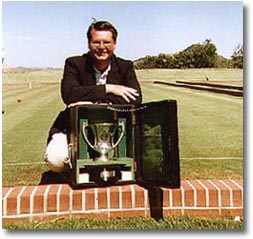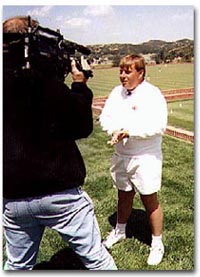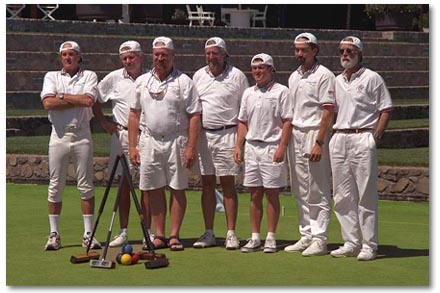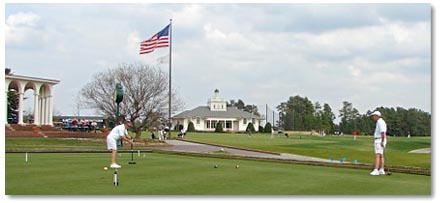

|
Back to |
| The Front Page |
| News & Features |

|
Cancellation of '07 Solomon opens Pandora's box of issues |
|||||
|
by Bob Alman photos by Bob Alman and Adrian Wadley Posted July 3, 2007
|
|
||||
The Solomon Trophy international test matches between the US and Great Britain were begun in 1988, alternating annually between England and America, but not contested in the same year as the MacRobertson Shield test matches among croquet's big four, played approximately every three years. Fourteen Solomons have been played, between six-person teams from each country. For the first time, in 2007, the Solomon has been canceled, and the ensuing controversy centers on the questions, "How did this happen?" and "How can it be prevented in future?" The answers and proposed solutions depend on their source, but this much seems likely: In future Solomon years, the USCA invitations will be sent out at an earlier date, and all eligible USCA players in North America will be considered as prospective team members.
At some point in the month of May, the USCA, on the advice of some combination of the International and Selection committees, decided to cancel the 2007 Solomon Trophy matches scheduled to be played July 18-21 in Manchester's Heaton Park, a large complex built for the Commonwealth games with three croquet lawns said to be the best in England. According to the USCA Selection Committee, only three of the invitees had responded to their invitation to be on the 6-person American team: Jim Bast, David Bent, and Stewart Jackson.

|
| Chris Clark at Sherwood in '97 displays the Solomon Trophy to be taken back to England, where it has resided continuously since the beginning of the competition in 1988. |
USCA president Rich Curtis gives two explanations for what happened: "...the unavailability of some players because of the recent MacRob and the fact that the USCA didn't do a good enough job of getting notice out to a wider range of potential players early enough."
Rhys Thomas, chair of the USCA International Committee, was more explicit: "I believe we failed to select a 2007 Solomon team due to poor advance planning and poorer player notification. Not enough USCA players were apprised of the opportunity to compete...and subsequently, not enough players made themselves available to field a full team. The International Committee and Selection Committee will strive to make sure this does not happen again."
| USE OUR READERS' FORUM TO POST YOUR VIEWS ON THIS ISSUE |
|
Because the Solomon Trophy cancellation in 2007 has aroused so much controversy, and especially because Croquet World has been unable to elicit comment from several of the key figures, we invite anyone and everyone to share in this public forum, at any length. The Bulletin Board Forum constitutes a permanently indexed complete record of all the conversations posted there. Just click on "Submit a Posting" and follow the menu.
|

|
| Robert Fulford plays to the TV cameras at the '97 Solomon at Sherwood Country Club. A side benefit of the event, wherever it is held, is to promote the game as well as the premium venues where they are usually played. |
"It's also, in my experience, an extremely enjoyable event to play in," Cordingley continues. "Moreover, I would have thought the Yanks' relatively good showing in the Mac had some connection to their experience in the Solomon."
As to the future of the Solomon, Cordingley says, "Rob [Fulford] will be talking with Jerry [Stark] and others about the future of the event, and I've asked him to make it clear we'd be very disappointed if it came to an end altogether."
Stephen Mulliner, a veteran members of British teams, reflects the common-held view on both sides of the Atlantic that the Solomon should have been played with whatever teams were available, commenting on the Nottingham Board, "I was asked by Jerry Stark, when he visited the North American Open in May, whether I thought it was better to field a weak US Solomon Trophy team or to scrap the event for this year. I had no hesitation in recommending the former."

Tremaine Arkley, stage-manager of the prestigious Resort Invitational in Oregon, weights in with, "I think the USCA Selection Committee, despite good intentions, blew it this year by not going down deep to come up with a Solomon Trophy team regardless of the strength of the final choices. As a member of many weak Solomon Trophy teams in the past, I can say that the experience gained was what was needed for us to achieve a higher standard of play. It was just plain short sighted not to have given the opportunity this year for lower ranked USA players to go overseas and compete against Great Britain. All of them would have come back better for the experience."
If the furor over the cancellation of the 2007 Solomon has revealed anything useful, it's the extreme popularity of this event with players on both sides of the Atlantic. Rhys Thomas, head of the US International Committee, as well as everyone in the planning and selection processes, affirms that the Solomon tradition will continue. In response to Croquet World's direct query, Thomas said flatly, "Yes, we will contest the Solomon in England in 2008."
What are the lessons learned?
There is near unanimity on the American side about what should be done to prevent a recurrence. Johnny Mitchell, chair of the US Selection Committee, said that 73 invitations were sent out to "eligible Americans" in March, four months before the 2007 Solomon was set to be played in July. Mitchell, USCA president Rich Curtis, and others on the US International Committee (which decides the whether/when/where of international events) all affirm that in the future invitations will be sent out earlier to ensure that the best available team can be selected.

|
| Team captain Jerry Stark (third from left) with his American team at the Sonoma-Cutrer Solomon in 1999. Picture by Adrian Wadley. |
Mitchell, as chairman of the US Selection Committee, is ultimately responsible for deciding exactly who should be invited, and this issue is likely to be much debated over the next six months, as selections for the 2008 American team are contemplated. The question has two parts: First, should the invitations be made on the basis of ranking alone? And secondly: Should the geographical base of the American team be expanded to include Canada and other non-US members of the USCA in the American hemisphere?
Oh, Canada!
| THE SOLOMON TROPHY RECORD | ||
|
Great Britain has won all 14 test matches against the US. The Solomon is not played in MacRobertson Shield years. This is the first two-year gap - 2006 and 2007 - since the Solomon Trophy matches was instituted in 1988. The SOLOMON can resume in 2008 in England, to be followed by another in 2009 in America, though this has not yet been officially confirmed. The next MacRobertson Shield is in 2010. The figures below show the final scores. The strongest performance for the US was in 2002, when the Americans won eight of the 21 matches. In 2005, the score was tied 7-7 until the last day, when Great Britain won all the remaining seven matches.
|
Leo McBride, one of the top two top Canadian players (along with Brian Cumming) who would be affected by a geographical expansion of Solomon selections, has mounted an active campaign to have Canada included not only in the Solomon, but also in the sport's ultimate team event, the four-nation MacRobertson Shield, contested approximately every three years among the UK, US, Australia, and New Zealand. Although getting the approval of the MacRob nations for such an expansion may prove to be a difficult and lengthy process - as it would strengthen an American team which has already displaced one or another of the New Zealand and Australian teams in the last three MacRob confrontations - including Canadian in the invitations for the 2008 and future editions of the Solomon Trophy matches appears at this point to be a virtual fait accompli.
Cordingley and members of the likely British side of the Solomon have raised no objection to including Canada in future Solomons, and in fact informally approved an expansion this year, when the scarcity of eligible players were revealed. But this determination was not reached until May, and by that time, both top Canadian players were unwilling to adjust their playing schedule. (McBride maintains that he surely would have joined the team if he had been asked in March, with the other 73 invitees, and he would have played in the British Opens as well, as the two events were scheduled back-to-back.)
Whither the MacRob?
| REMEMBERING THE PRESIDENTS CUP AT THE 1997 SOLOMON AT SHERWOOD |
|
One of the most entertaining aspects of the Solomon Trophy matches in the last Century was the one-day Presidents Cup matches on the last day, which were a separate American Rules team event, played for doubles. In 1997, the Brits won all nine games. The British showed no fear of deadness: they simply peeled the dead partner ball out of trouble! Midway the Cup event, word spread through the 4-lawn complex that Robert Fulford was playing "the first American rules sextuple." Something went awry after only three peels, so that bit of croquet history had to wait for another day. It's a shame that this entertaining feature of the Solomon has been abandoned. The Americans' shooting skills have improved in the interim, and they would have a better chance of beating the Brits today in the American Rules game - especially with the addition of the best Canadian players.
|
Jim Nicklasson, President of Croquet Canada and member of the USCA, supports the creation of a "unified North American team" and is also one of many who have suggested the creation of a "second tier" for the MacRobertson Shield international team event, currently limited to the top four countries. "With the agreement of the President of the USCA," he says, "I would offer to start a dialog with the USCA on...developing a plan to propose to the croquet associations within North America and then to the rest of the MacRob participants." The "other associations" in addition to US and Canada might be Bermuda, Mexico, and St. Croix.
One can only imagine how cumbersome the process might become of grinding through numerous committees in the "big four" countries a detailed proposal for altering the conditions of the venerable MacRobertson Shield team competition. But perhaps the World Croquet Federation could effectively godfather such a process to a successful conclusion. There have been various changes in the MacRob format over the eighty years, the most recent of which was bringing in the late-blooming US in the late eighties.
Rhys Thomas of the USCA International Committee is cautiously optimistic: "Having considerable responsibility for what you've been told in the past, I want to assure you that the International Committee is exploring all options for 'USCA' teams. It's a tricky, heated and contentious matter, one that is loosely governed simultaneously by the WCF and all its members, and the current MacRob nations - the Big Four. The MacRob, at 80 years old, has always defined 'eligibility' and tends to overshadow the WCF, which is barely two decades old.
"But the WCF has credible guidelines that suit all. Still, eligibility in the modern era of croquet is always being negotiated. That's why the Selection Committee recently petitioned Great Britain to allow Canadian inclusion in this year's Solomon Trophy test match. Unfortunately, that didn't work out [because of the Canadians' unavailability]. But such circumstances afford us all the opportunity to reexamine the question, and maybe sway some additional votes. It may take time, but it's a positive step forward."
North Carolina fills a void
As it turns out, the cancellation of the 2007 Solomon has not amounted, at all, to preventing top-level transatlantic competition. In fact, "the North Carolina boys" scheduled a superb top-level team competition for late June at Pinehurst featuring what Danny Hunnycutt has described as "the strongest international team ever assembled" to take on North Carolina's top six players - who are very nearly America's top six in the current era of North Carolina's dominance of American player-power. (See detailed reports on this "International Select Teams" event on our Bulletin Board.)
Another new North Carolina event that promises to be super-popular with top players is the North Carolina Teams Challenge in August 2007, for which invitations were sent out in February (USCA Selection Committee: Take note of the timing!). The team event will be similar to the MacRob, and the admirably strong teams, of balanced strength, have already been announced: The North Carolina team will be Danny Huneycutt, Jeff Soo, Paul Scott, Damon Bidencope, Bob Cherry and Ron Lloyd. The "rest of the USCA" team will be: Leo McBride, Jerry Stark, Rich Lamm, Brian Cumming, Stewart Jackson and Doug Grimsley - including the two top Canadians, Cumming and McBride. According to Ron Lloyd, the Pinehurst resident croquet pro who has a major hand in planning and organizing the events, plans are underway to expand the number of teams in 2008.

|
| North Carolina's Pinehurst hosts the strongest team events of the year on the North American continent. Photograph courtesy of the North Carolina Croquet Club. |
Although on an official level, everyone is careful to say that the star-studded International team event the North Carolinians organized for late June was not planned as a substitute for the Solomon and should not be considered in any way a "cause" of the Solomon cancellation, comments of some USCA officials have implicitly made the opposite case, including the suggestion that the North Carolinians have been "self-serving" when they should be doing more to support USCA croquet generally.
This criticism brought a stinging rebuke from Danny Huneycutt, the North Carolinian who is now the top-ranked American by a small margin. "For all you guys making comments [that] North Carolina should raise money for USA teams before sponsoring our own events, there are either short memories or ignorance. The NC District put on a major fund raiser this past year, and each MacRob player received a sizable supplement from the USCA to cover cost, most of which came from the NC efforts. Others talked about it, but nothing happened."
Louis Nel, former president of Croquet Canada, summed up the leadership role taken by North Carolina this way: "During the last few years North Carolina has reshaped the croquet landscape in North America and has become its center of gravity. As far as I am aware, they did not get any special favors from the USCA towards this development; they did it through their own initiative and hard work - tournaments, clinics, and general good organization. To look upon their further initiatives as 'self serving' seems unfair to say the least..."
All croquet is local
The historic pattern of croquet's growth in America through a succession of strong local and regional developments - in Florida, Arizona, Northern California, and now North Carolina - has shown that the most effective development work is always done by as close-knit group of enthusiastic players and organizers, with hands-on responsibility for their work and their results. The USCA Planning Committee has implicitly acknowledged the nature of the USCA organizational beast - the diffuse structure of a national volunteer-based organization and the difficulty of coordinating effective "national" initiatives.
The USCA Planning Committee - chaired by North Carolinian Gene Young and with other North Carolinians in key roles - have provisionally adopted a slogan for their 2008 planning year: ALL CROQUET IS LOCAL. The intention is to have the national organization do what it can to support local action, rather than try to direct local activity from a central point. Applied to North Carolina's role in current events, instead of worrying about how North Carolina is stealing the USCA's thunder, the USCA might well ask the North Carolina boys, "What can we do to help your brilliant initiatives in bringing top-level croquet to the US and promoting the growth of our sport?" And even further, "What can we learn from your good example?"
North Carolina initiatives have done a lot to compensate for the often lackluster performance of the official American croquet national organizations and the 12-court National Croquet Center owned by the Croquet Foundation of America which, by all rights and expectations, should be managed and promoted as the worldwide mecca of the sport. Instead, the National Croquet Center, in abandoning the internationally promoted annual annuals held in its first years - "Association Croquet the English Way" and the "International Croquet Festival" - has created a leadership vacuum which the "North Carolina boys" have filled admirably, with high industry and enterprise. Despite the limited court space at Pinehurst (compared with the 12-court Center in Florida) North Carolina is clearly the most popular American venue for top-ranked players everywhere.
Only the USCA's "Selection Eights" event in October at the National Croquet Center offers a comparable opportunity for top-level Americans (up to 28 of them) to hone their skills in competition. So North Carolina is providing a more effective training ground for the development of USCA players than the "national" croquet entities. Is there anything wrong with that picture? No, not necessarily, not as long as the job is getting done. Clearly, the North Carolina boys are getting it done.
Moreover, the bigwigs of the USCA have pledged to do a better job next year. They should be taken at their word.
|
THE PROSPECTS FOR COMPOSITE TEAMS
IN THE TRI-ANNUAL MACROBERTSON SHIELD
Only one of the top players and officials informally polled by Croquet World Online has been willing to argue against expanding the geographical base of American MacRob selections - comparable to the expanded base of England's selections that include may include Scotland, the Channel Islands, and Northern Ireland, all of whom have beefed up British teams in the distant and near past. They have made polite responses which, however, would likely be moderated if a concrete proposal is formally submitted by the USCA. The single exception is John Prince, veteran of many MacRob teams over a period of decades, who told us, " If the Canadians and American's want to field a composite team, as the Great Britain 'home nations' already do, well, that is over to them. I'm sure I wouldn't want to be part of an ANZAC team, no matter how strong it may be, and would hope that Aussie players feel the same." Branding himself an 'old fashioned traditionalist' Prince cites his "huge personal sense of pride in playing for my country as we have tried to win croquet's ultimate prize for New Zealand. While I sympathize with players from nations who are not yet able to field six-player teams, I would not like to see player numbers compromised in the Mac." If the USCA should raise the issue of including Canada in future MacRob teams, it could not happen before the 2013 games, and only then after a lengthy process of informal discussions and official rulings of the four MacRob nations. |
|
HOW A 2ND DIVISION MACROB
MIGHT BE ORGANIZED
The success of the World Croquet Federation over the last two decades in promoting the establishment of national organizing bodies in more than 20 nations of the world argues strongly for an expansion of "world teams" play. Creating a "second division" for the MacRob might be the appropriate occasion for bringing the WCF together with the MacRob "big four" in an aligned vision for the future of croquet's world team events. Here's one way it could be done: * Up to three Challenge Nations could be selected to compete - along with the fourth-ranked nation in the previous MacRob in a format similar to the First Division MacRob. * The Challenge Nations could be chosen on the basis of the aggregate ranking of their top six players in the world rankings. * The 2nd Division MacRob could be played in either of the two "off-years" of the 1st Division MacRob, at a suitable venue in one of the three Challenge Nations, to be selected on the basis of the "best bid," with strongest consideration given to the candidate that covers the largest portion of the visiting players' expenses. * The highest scoring of the four teams in the 2nd Division MacRob would be eligible to be the fourth team in the next 1st Division MacRob. * The current four MacRob nations would have to agree to this change before the next MacRob, in 2010, to prepare for the 2nd Division challenges to take effect for the 2013 MacRob in New Zealand.
* To spare the "big four" the considerable work required to mount a "2nd Division," the new team event could be organized and managed by the WCF and the non-MacRob nations. |
|
"DOWN UNDER" VERSION IS THE TRANS TASMAN Towards the end of the 1979 MacRobertson Contest held in New Zealand, the Australian team Captain Bill Smith spoke passionately to members of the Kiwi side about launching a Trans Tasman contest - named for the Tasman Sea separating New Zealand from Australia. But it wasn't until 1988 that something actually happened, when Australian President Dr. Val Payne and her New Zealand counterpart Ashley Heenan jointly presented a trophy for a Trans Tasman Women's Challenge. The purpose was to lift the standard of play amongst women players, as few were gaining selection for the MacRobertson teams. It must be noted that this goal was not really achieved, as the last women to make the New Zealand side was in 1989 and for Australia 1990. The series continued until 1997, with Australia having won four of the five contests. In 1991 a Trans Tasman Open Test series was also established with the intention of each team fielding some current MacRobertson players along with some promising newcomers, but it was generally felt that the Aussies fielded a full strength side, so in 1994 New Zealand returned the compliment with more player-power of its own. In 1995, the series was a much more even affair, resulting in a close victory for New Zealand. The current format, something of a compromise, was inititated in 1999, with each team made up of four top men and four top women players. New Zealand has won all four of these bi-annual contests. - John Prince |
Post your comments to Croquet World's Forum
We have created a public forum open to everyone for comment on this issue, so nobody's viewpoint needs to be unrepresented. Just click on this link to the Bulletin Board Forum on "The Solomon '07 Cancellation", then click on the the SUBMIT A POSTING link at the top of the index, and follow the menu.